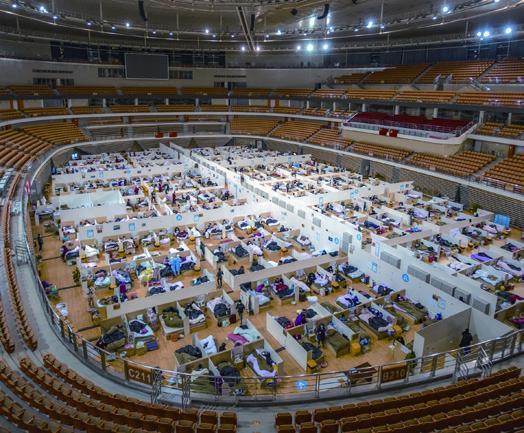A MEETING OF MINDS

The National Committee of the Chinese Peoples Political Consultative Conference, the top political advisory body, comprises representatives from all political parties and all sectors of society. Among them are international studies experts. Some of them shared their observations on Chinas response to the novel coronavirus disease (COVID-19) epidemic and explained how a community with a shared future for humanity is relevant during this period and beyond. Edited excerpts of their views follow:
Huang Ping, President of the Chinese Association of American Studies
C h i n a h a s made initial achievements in the battle against the novel coronavirus epidemic thanks to the strong central leadership, unified allocation of resources, flexible adjustments in public health systems and mechanisms such as building temporary hospitals, and release and analysis of information in a timely manner. The general public has also followed the instructions on epidemic prevention and control proactively.
The virus is the worlds common enemy. Some Western countries have demonized and smeared China on the epidemic outbreak, while the facts speak louder than words. Some have even blamed China for the epidemic, filed lawsuits and asked for economic compensation. Such actions can yield no results and only pose challenges to the global pandemic response. Only by staying calm and seeking scientific and practical solutions can countries jointly cope with the public health crisis. Playing games through conventional political means in international relations will not help to curb the epidemic.
The epidemic has further highlighted the value of the community with a shared future for humanity. Countries around the world used to be separated, but in the era of globalization, they cannot cope with global challenges like climate change, food and water shortages and epidemics on their own.
A community with a shared future needs to be based on common and tangible interests. Countries are supposed to shoulder responsibilities together and combat the epidemic to reduce deaths and protect peoples well-being.
Provocative actions of the United States are guided by the law of the jungle, based on the belief that countries cannot benefit each other in a world with limited resources, and that it will suffer a loss once other countries take a larger share of the pie. However, the policy of “America First” is equal to isolating the country itself.
Gao Hong, a research fellow on Japanese studies with the Chinese Academy of Social Sciences Chinas Spring Festival is the period of the countrys largest movement of population. If unchecked, COVID-19 would have spread more rapidly.
At that critical moment, the Communist Party of China (CPC) Central Committee took an array of measures to contain the source of infection, cut off the transmission channels and carry out comprehensive prevention and control. Local governments also built solid anti-epidemic lines of defense.
The whole nation united to fight against COVID-19, and the situation was reversed. Domestically, the peak of this round of the epidemic has passed and China has entered a stage to revive its socioeconomic development. The CPC has played a kernel role in the process by making overall plans and pooling resources, which fully demonstrates the institutional advantage of socialism with Chinese characteristics.
The pandemic has no borders while love transcends borders. The novel coronavirus is not only the enemy of China, it is a common enemy of humankind. Since the outbreak, China made great sacrifices and took decisive measures to lock down a 11-million-population city to cut the source of infection, uniting the whole country and people to combat the disaster.
The global outburst further highlighted the importance of building a community with a shared future for humanity, which is a sensible choice for coping with the current and future global issues. When China was grappling with COVID-19, many countries lent a helping hand. The Japanese Government, enterprises and people provided epidemic control and prevention materials in a timely manner to meet Chinas urgent needs.
After the virus spread across Japan, China also tried its utmost to offer help. Experts from the two sides held teleconferences to exchange tactics and experience, and Chinese citizens in Japan distributed free masks on the streets, returning Japanese peoples amity in various ways.

Han Fangming, Vice Chairman of the Foreign Affairs Committee of the CPPCC National Committee and Chairman of the Charhar Institute
The global economic downturn resulting from the epidemic is worse than the previous economic crises in recent decades. Since uncertainties still exist, the epidemic-induced recession is almost as severe as the Great Depression of the late 1920s and the 1930s. The impact of the epidemic on the global economy is unlikely to be weathered within this year. Facing a cunning enemy like the virus, humankind needs to adapt to changing circumstances by working in unison to explore ways of development.
Following the outbreak of this epidemic, the vision of a community with a shared future for humanity has been validated and reaffirmed. The world is pluralistic with different social and value systems and cultural backgrounds. When humankind is experiencing difficulties, all countries need to share experiences and lessons in the anti-epidemic battle and try to help each other overcome the epidemic.

